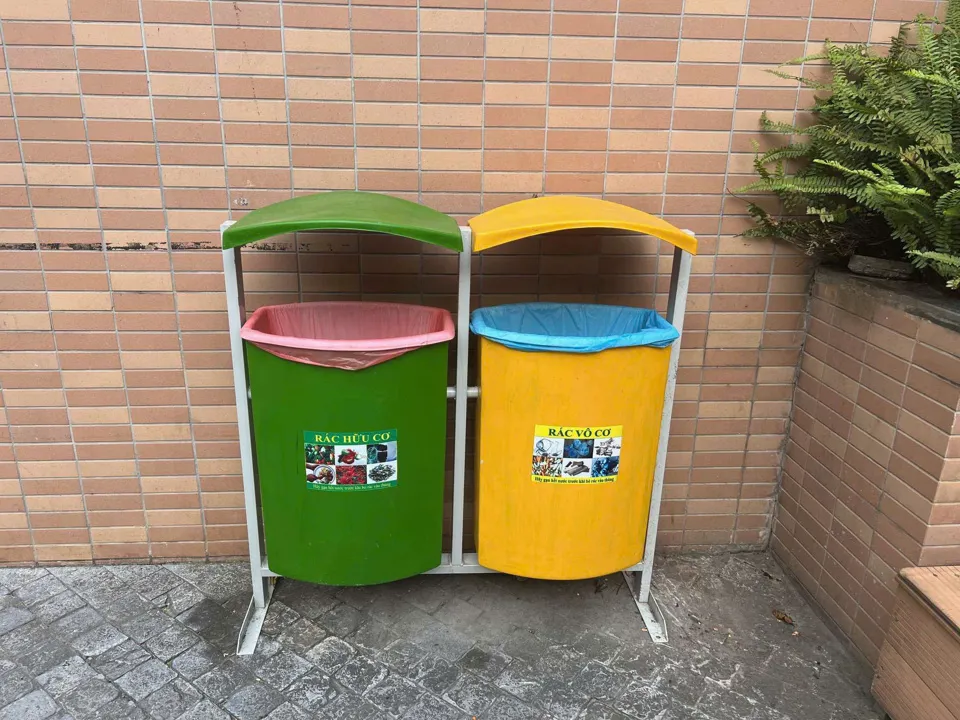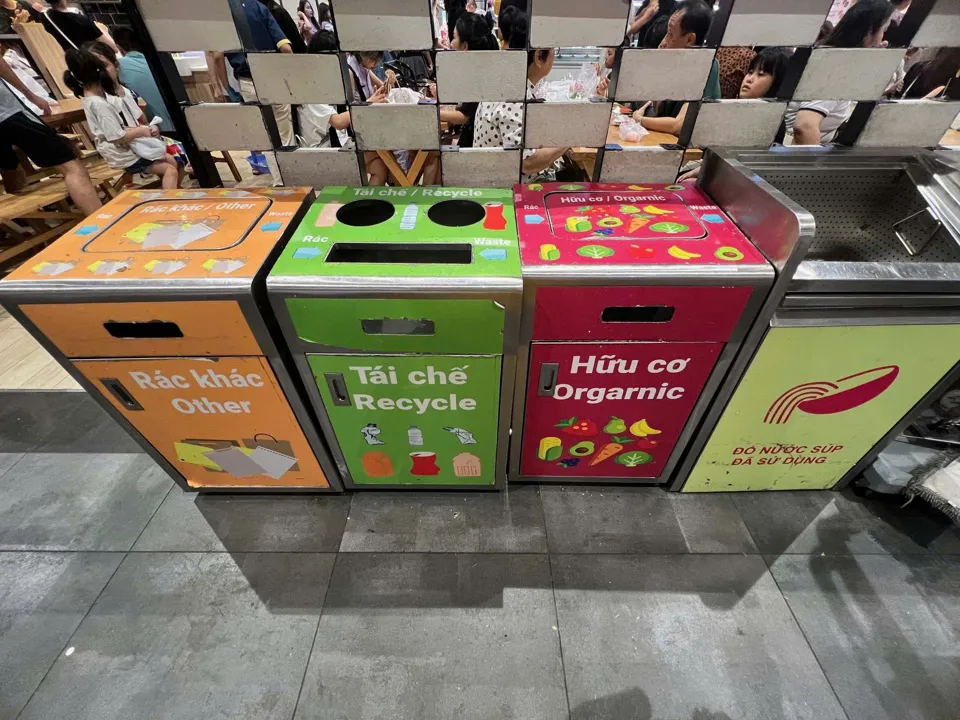Solid waste classification in Hanoi: Necessary at schools
Many schools continue to produce significant amounts of unsorted waste daily, largely due to students' inconsistent habits in waste classification.
Ideas suggested that effective waste management begins with proper classification, requiring clear implementation and heightened awareness across multiple stages, especially through education.
| Different trash bins for different kinds of waste. |
Hanoi’s schools are aware of the need but greater actions must be taken to ensure effective education.
Vietnam’s Environmental Protection Law 2020, effective from January 1, 2022, mandates that households and individuals must classify domestic solid waste by December 31, 2024. This regulation aims to boost recycling, reduce pollution, and instill environmental responsibility, particularly among Generation Z and Alpha students, who will shape the country’s future.
Hanoi schools are divided into urban and suburban areas, encompassing public, private, semi-private, and international institutions. Notably, some inner-city schools, especially private and international ones, have taken proactive steps in raising awareness about waste classification.
In 2020, the "Pioneering Schools in Waste Reduction and Classification" program in Hoan Kiem District led to the collection of 92 tons of waste, including 2.7 tons of recyclables, within a month.
However, many schools still generate large amounts of unsorted waste daily. The situation was caused by student habits in classifying waste. In reality, many of them discard plastic bags and bottles carelessly, especially at school events like festivals and fairs often resulting in a surge of waste like plastic containers and disposable cups.
| Equipping knowledge of waste classification to nearly 2,000 students at Hoang Dieu Primary School in Ba Dinh District, Hanoi in August 2024. Photo: The Hanoi Times |
To change the situation, many schools have improved student’s awareness of sorting waste at sources through teaching materials such as printed documents, stationery, and craft supplies, contributing to waste accumulation.
Despite the legal requirement to sort waste into three categories: recyclables, food waste, and other domestic waste, many schools only use two bins or lack proper facilities altogether. Some schools even have just one type of bin, leading to waste overflow and environmental hazards.
Professor Hong Thai from Hanoi University of Science and Technology advocates for standardized waste classification guidelines for schools at all levels. He suggests engaging students, especially from secondary school onward, in waste collection and recycling projects to cultivate environmental responsibility.
By integrating structured waste management systems and fostering eco-conscious behavior among students, Hanoi’s schools can play a pivotal role in promoting sustainability and reducing environmental impact.
Waste management in schools and public areas remains challenging. This reality prompts the urgent need for community engagement. Individual initiatives can drive meaningful and sustainable change.
| Students of Hoang Dieu Primary School are equipped with knowledge of waste classification. Photo: The Hanoi Times |
As members of Generation Z and Alpha, while waiting for official policies to standardize waste classification at the source, we propose a practical initiative applicable to all school models.
In addition, it’s necessary to have mandatory waste sorting as a school activity. For example, every Monday, teachers and students would conduct a thorough cleaning and waste sorting session in both classroom and common areas. This would integrate environmental responsibility into the school’s activity schedule.
“Making waste classification mandatory is feasible because only through decisive, official, and coordinated actions across all sectors, including thorough preparation and waste management technologies, can we achieve our environmental goals,” said Trinh Huu Toan, President of NESEN.
To make the implementation plan effective, it requires standardized trash bins. Schools should distribute standardized two- or three-compartment bins across classroom clusters, ensuring effective waste separation.
At the same time, the school should cooperate with waste collectors. The partnership with waste management companies will assess sorting performance and provide weekly reports, identifying top-performing classes.
| Trash bins for organic waste, recycling, and other kinds. Photo: The Hanoi Times |
Meanwhile, the facilities also incorporate waste sorting into student performance criteria, even including it in report cards, motivating both students and teachers.
Schools could also host weekly or monthly exhibitions showcasing recycled products made by students, integrating this into craft classes to replace less practical projects.
“This initiative is suitable for middle and high school students. They are mature enough to act responsibly while ensuring safe and reasonable waste sorting,” said Professor Hong Thai from Hanoi University of Science and Technology.
“While a plastic-free future might seem distant, reducing solid waste’s harmful effects and promoting recycling is achievable now. Generation Z and Alpha must lead this charge and we are confident we can make it happen,” according to the Green Hanoi Group which advocates environmental protection.













